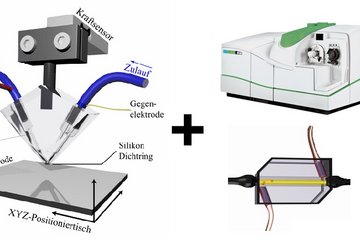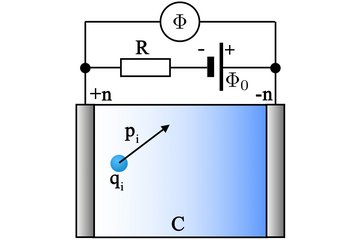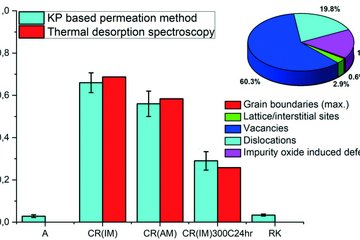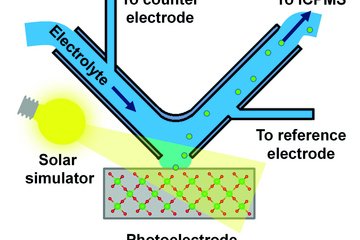All genres
21.
Talk
Unexpected Stress Induced Martensite Formation in Ultra-strong Pearlitic Steel. 2016 TMS Annual Meeting & Exhibition, Symposium: Advanced Characterization Techniques for Quantifying and Modeling Deformation
, Nashville, TN, USA (2016)
22.
Talk
Measurement of grain boundary chemistry and crystallography by atom probe tomography and correlated electron microscopy. Thermec 2016, Graz, Austria (2016)
23.
Talk
Transformation de phase induite par déformation plastique sévère des aciers perlitiques. XIe Colloque Rayons X & Matière, Grenoble, France (2015)
24.
Talk
Deformation-driven phase transition in severely cold-deformation pearlitic steel. General Meeting on the Mechanics of Nano-Objects, Marseille, France (2015)
25.
Talk
Supersaturated ferrite in severely cold-drawn pearlitic steel - X-ray diffraction study. Pearlite Workshop, MPI für Eisenforschung GmbH, Düsseldorf, Germany (2015)
26.
Talk
Bulk Nanostructured Steels. Seminar at Ecole Polytechnique Federale de Lausanne (EPFL), Institute of Materials (IMX)
, Lausanne, France (2014)
27.
Talk
Joint crystallographic and chemical characterization at the nanometer scale by correlative TEM and atom probe tomography. Workshop: White-etching layers in ball and roller bearings, Informatik-Zentrum Hörn, Aachen, Germany (2014)
28.
Talk
Recent Advances in Understanding the Structures and Properties of Nanomaterials. Gordon Research Conference on Structural Nanomaterials, The Chinese University of Hong Kong, Hong Kong, China (2014)
29.
Talk
Nanostructure Manipulation by Segregation Engineering. George Smith Symposium on Atom Probe Tomography, Oxford, UK (2014)
30.
Talk
Nanostructure Manipulation by Segregation Engineering. 2nd ESISM International Workshop on Fundamental Issues of Structural Materials, Kyoto, Japan (2014)
31.
Talk
High Throughput Quantification of Grain Boundary Segregation by Correlative TEM and APT. TMS 2014, Solid-State Interfaces III Symposium, San Diego, CA, USA (2014)
32.
Talk
Atomic scale understanding of 7 GPa ultra-high strength pearlite. TMS 2014 - Mechanical Behavior Related to Interface Physics II Symposium, San Diego, CA, USA (2014)
33.
Talk
Synchrotron X-ray diffraction study of cold-drawn pearlitic steel. Pearlite Workshop, MPI für Eisenforschung GmbH, Düsseldorf, Germany (2014)
34.
Talk
High Throughput Quantification of Grain Boundary Segregation by Correlative Transmission Electron Microscopy and Atom Probe Tomography. International Conference on Atom Probe Tomography & Microscopy 2014, Stuttgart, Germany (2014)
35.
Talk
Atomic-Scale Mechanisms of Strengthening in Wire Drawn Pearlite. MRS Fall Meeting, Boston, MA, USA (2013)
36.
Talk
Quantification of Grain Boundary Segregation in Nanocrystalline Material. Seminar at Department Microstructure Physics and Alloy Design, MPI für Eisenforschung, Düsseldorf, Germany (2013)
37.
Talk
Nanostructuring of bulk steels. International Conference on Computational Modeling of Nanostructured Materials - ICCMNM 2013, Frankfurt Institute for Advanced Studies, Frankfurt a. M., Germany (2013)
38.
Talk
Atomic Scale Understanding of 6.8 GPa Ultra-high Strength Pearlite. 8th Pacific Rim International Congress on Advanced Materials and Processing (PRICM-8), Waikoloa, HI, USA (2013)
39.
Talk
Nanostructures in 1 Billon Tons: Interface Engineering in Complex Steels and Biological Nanocomposites. Materialwissenschaftliches Kolloquium, Universität Hamburg-Harburg, Hamburg, Germany (2013)
40.
Talk
Structure of ferrite in cold-drawn pearlitic steel by X-ray diffraction analysis. Mechanics Meets Energy, MPIE, Düsseldorf, Düsseldorf, Germany (2013)











